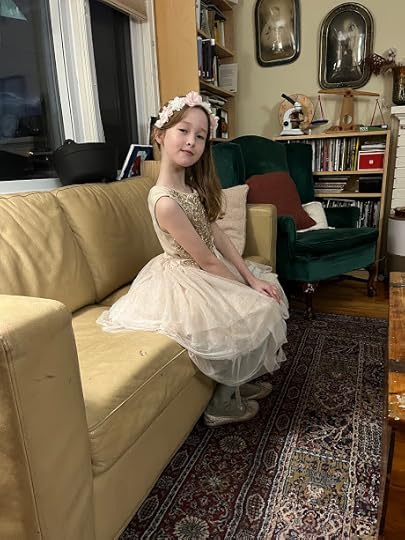Rob Mclennan's Blog, page 71
November 21, 2023
12 or 20 (second series) questions with Paola Ferrante
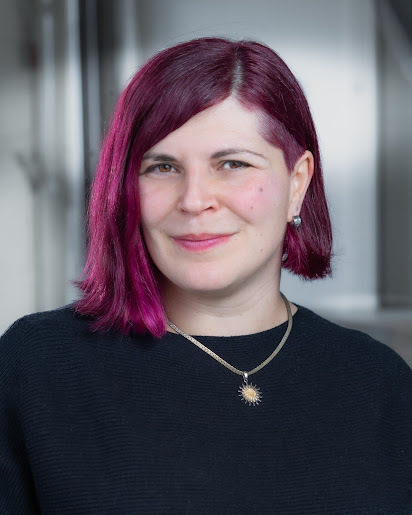 Paola Ferrante
[photo credit: Rob Skuja] is a writer living with depression. She has won Grain Magazine’s Short Grain Contest for Poetry, The New Quarterly’s Peter Hinchcliffe Short Fiction Award, Room Magazine’s Fiction Contest and was longlisted for the 2020 Journey Prize for the story “When Foxes Die Electric.” Her work appears in After Realism: 24 Stories for the 21st Century, Best Canadian Poetry 2021, North American Review, PRISM International and elsewhere. She was born, and still resides in, Toronto.
Paola Ferrante
[photo credit: Rob Skuja] is a writer living with depression. She has won Grain Magazine’s Short Grain Contest for Poetry, The New Quarterly’s Peter Hinchcliffe Short Fiction Award, Room Magazine’s Fiction Contest and was longlisted for the 2020 Journey Prize for the story “When Foxes Die Electric.” Her work appears in After Realism: 24 Stories for the 21st Century, Best Canadian Poetry 2021, North American Review, PRISM International and elsewhere. She was born, and still resides in, Toronto.1 - How did your first book change your life? How does your most recent work compare to your previous? How does it feel different?
My first book, What to Wear When Surviving a Lion Attack , was a book of poetry and at the time, I honestly felt it changed my life in that I felt I could call myself a “real” writer when it happened. In terms of comparing my debut poetry collection to my debut fiction collection, I will say that horror, fairy tales and plenty of animals in the service of exploring women’s experiences also definitely made appearances in my poems, but I think I’ve taken these motifs to a more interesting place in Her Body Among Animals , using the conventions of genre fiction, specifically horror and sci-fi, and meshing that with fairy tales and pop culture to look at how women challenge the boundaries placed on their bodies, and the violence enacted against both women and the earth because of toxic masculinity. What feels different this time is the reach of the book to be honest. Poetry can be a lonelier endeavour than fiction; with poetry you hope that maybe some other poets read your book and like it. With Her Body Among Animals, it’s felt so validating to read reviews of my work that describe exactly what I hoped readers would get from the experience. I couldn’t believe Publishers Weekly gave me a starred review, and having a review from The Toronto Star’s Robert J. Wiersema fulfilled an actual childhood dream. Also, getting compared to a short story great, Alice Munro (NOT in any sense of my style, but in how detailed our worlds both are) pretty much made my day. With fiction, I feel I’ve gotten to hear how people are affected by the work more, and it feels fantastic to know readers are connecting with my work, to talk to the amazing Bookstagrammers and the wonderful readers that I’m so lucky I get to meet at festivals.
2 - How did you come to short stories first, as opposed to, say, long fiction or non-fiction?
I think short fiction co-evolved with my tendency to write poetry, in that I enjoy having a finite space to play around in, as well as the opportunity to experiment with form. With short fiction, I can get away with cool formal tricks, like telling the story of a domestic abuse situation and then juxtaposing it with legends about lizard men, or in the case of “The Underside of A Wing,” a double third person narration technique to mimic the surreal dissociative experience that I had being in a mental health crisis, with lines like “She often experiences excessive worry;the albatross never experiences worry that isn’t excessive. The albatross sometimes experiences worry in social situations; she always worries that others will notice the albatross.” These techniques tend to get really old, fast when attempting a novel-length work of fiction, either feeling forced or gimmicky. I am currently working on a novel, and some of the more unconventional techniques in short fiction definitely don’t work in long-form fiction. As for non-fiction, that is a beast I don’t go anywhere near! I don’t enjoy the nakedness that comes with non-fiction, and I don’t enjoy being beholden to the truth of an event. I’m more of the “why let truth get in the way of a good story” type of person. Plus, every time I go to tell even a realist short story, a metamorphosis into a spider, or a lizard man jumps into the mix. So I truly don’t think non-fiction will ever be for me.
3 - How long does it take to start any particular writing project? Does your writing initially come quickly, or is it a slow process? Do first drafts appear looking close to their final shape, or does your work come out of copious notes?
Starting a short story is fairly quick; but after the initial idea phase though, I end up in the garbage draft zone for what feels like forever, where I rewrite and rewrite and rewrite the first third of a piece until I’m convinced what’s on the page is a story going somewhere and it starts to look close to its final form. (Alternatively I also might realize the idea I had is going nowhere and the piece gets consigned to the dumpster file on my computer). I’m a fairly slow writer when it comes to short fiction, because not only am I interested in plot and character and voice; at some point my poetry training also kicks in and I spend a lot of time reading my work out loud to make sure the rhythm at a sentence level is also correct for the rhythm of a science. From start to a draft that I’d be sending out to literary magazines, a month is the shortest time I’ve ever taken. “The Underside of a Wing,” which was the hardest piece for me to write in this collection(and which started life as an absolutely awful realist short story in a pet store of all places), actually took about four months, the first two of which were just finding the form and voice to tell it in.
4 - Where does a poem or work of prose usually begin for you? Are you an author of short pieces that end up combining into a larger project, or are you working on a "book" from the very beginning?
For me, stories generally start with a conceptual idea; say “mother experiences postpartum anxiety as a haunting,” or “girl loses herself in relationship while boy falls in love with a literal shadow of herself.” Sometimes stories start from news articles I’ve read as well; the first story in Her Body Among Animals, “When Foxes Die Electric,” was born from an article my husband showed me about a sex robot during a tech convention who was touched too much and actually shut herself down. When it comes to short fiction I’ve learned I’m truly a “pantser;” trying to outline my short stories has never worked for me so it should surprise absolutely nobody that, while of course I want to be working on a book from the very first short story, I honestly have very little idea of what I have is a book at all until maybe 40 000 words in. That’s the point where I could start to see the thematic connections between what I’d written already. That was imperative, because then I could write the next half with the idea that the new stories needed to tie into the thematic ideas of women challenging the boundaries placed on their bodies and of the entitlement of toxic masculinity enacting violence on both women and the natural world. At that point it was a bit like putting a multi-dimensional puzzle together; I had to write stories that dealt with these themes, that used horror and sci-fi and existed in the realm of the speculative, and that, of course, had animal imagery, which was already running rampant throughout the stories of Her Body Among Animals.
5 - Are public readings part of or counter to your creative process? Are you the sort of writer who enjoys doing readings?
I actually love doing public readings for two reasons. One is that I love seeing the real-time audience reaction to a piece I’m reading, . The other is that writing is a lonely business, and public readings are a fantastic chance to get to really know other writers and their work. For any aspiring writers out there, I can honestly say that connections I’ve made at public readings and at literary festivals like Eden Mills, Kingston Writers Fest, Toronto International Festival of Authors, and the fabulous Wild Writers have given me so many opportunities. Because of the connections I’ve made, I’ve had everything from invitations to speak to creative writing students at universities, to actually meeting and getting invited to submit the manuscript that would become Her Body Among Animals to one of my now-agents.
6 - Do you have any theoretical concerns behind your writing? What kinds of questions are you trying to answer with your work? What do you even think the current questions are?
7 – What do you see the current role of the writer being in larger culture? Do they even have one? What do you think the role of the writer should be?
I think writers are the people who tell us stories about humanity’s patterns; the concerns common to the human condition, the cycles that repeat over and over again. I know when I started writing the first story in Her Body Among Animals, “When Foxes Die Electric,” it was just before #MeToo exploded as a movement, and that particular story, about a sentient sex robot going against her misogynistic programming, was a reaction to that time, yes, but also something I felt I had been living with all my life as a woman. I think that’s the trick with writing. To be timely, but to write about why a particular issue is timely, and, in doing so, be timeless. There is another story in this collection, “Everyday Horror Show,” which features a mother who is experiencing postpartum anxiety as a poltergeist haunting. I originally conceived of this story because my own mother had postpartum anxiety way back when she had me in the 1980’s, when it was short of hand-waved as “oh, you just had a baby, you’re fine.” Before I finished this book, however, I had my own child, and it struck that, as someone with a mental health history, the system still hasn’t changed much. Yes, a social worker comes to check in on you in the hospital, but really, my experience with that was that it was more of a box checking exercise, a “yup, I saw here and I handed her an envelope of “resources.”” Whatever that means. I still haven’t opened the envelope. As I went through the process of writing the stories in Her Body Among Animals, I was really interested in exposing the mistakes in these systems that are set up to disadvantage certain people, with the hope that we can move on from them and do things better. I think that’s the responsibility of a writer; we are in the unique position to not only record, but illuminate the past so that we can learn from it, and hopefully break those negative cycles.
8 - Do you find the process of working with an outside editor difficult or essential (or both)?
My writing would be nowhere without the fantastic editors I’ve had over the years. Honestly I love being edited. I think I got to a point where I was winning short story contests like Room’s and The New Quarterly’s, and I felt “okay, I obviously have something good going on with my writing.” It was that confidence I had begun to develop that made me feel less terror at being edited—I began to view the editing process as I think all writers should. It’s a process meant to bring out the best in the story. Working with Malcolm Sutton on this book was a privilege and a total joy. I loved being able to go into editorial sessions and discuss where a piece needed to move to really bring out the best in it. And being edited by an outside editor, namely doing a mentorship with the fantastic Russell Smith, was what got Her Body Among Animals submission-ready. Currently, I’m actually also doing an mentorship with Carleigh Baker through Flying Books (highly recommend!) to develop my novel-in-progress. So I would have to say working with an editor is absolutely essential to my process.
9 - What is the best piece of advice you've heard (not necessarily given to you directly)?
“No one will care about your book as much as you do,” is the most sound advice I’ve heard, courtesy of the wonderful Kathryn Mockler. Honestly, that has helped me to keep things in perspective going through book launch season. As writers, we spend so much time focused on bringing our books into the world, that we obviously care very much what readers think of them, and doing the launch season tends to lead to pretty big emotions when you make the mistake of comparing yourself to how other writers are doing in terms of reviews, media attention, awards and just generally what the very intelligent Nathan Whitlock has called “the fickle hand of fate” that lets a book break through the noise in publishing. For me, what Kathryn Mockler said kind of brings it all back, for me, to knowing that I write for myself for first of all, because I genuinely enjoy creating these worlds and these stories. And remembering that helps to take the pressure off.
10 - How easy has it been for you to move between genres? What do you see as the appeal?
I’d say that about half of the stories in Her Body Among Animals were written in tandem with the poetry for What to Wear When Surviving a Lion Attack. At that time, it was easy for me to switch between genres; I always felt there was a clear line between inspiration that was definite poem fodder, and ideas like that news article about Samantha the sex robot at a gaming convention, which I immediately knew was a story. Moreover, I felt that poetry informed my fiction, giving my work a tone I know that Publishers Weekly described in a starred review as ”...hypnotic and visceral, weaving the richness of poetry with the economy of genre prose.” Working on poetry at the same time as fiction taught me to (somewhat obsessively) read my lines and scenes out loud, not only looking for plot and character and theme and the energy of a scene, but also the energy and the sound of a sentence, and whether this played into the whole of the piece. And, of course, poets are masters of what Emily Dickinson calls telling the truth “slant.” When I wrote Her Body Among Animals, I was very aware that I was writing about really hard subjects; postpartum anxiety, domestic abuse, women who are not acknowledged when they are having a mental health crisis. And I think telling the truth “slant,” borrowing the conventions of genre fiction such as horror, so that postpartum anxiety becomes a poltergeist haunted house story, or using fairy tale language (and urban legends about lizard men) so that an abusive partner is an unbelievable dragon, makes it easier for the reader to stay with a story and actually enjoy a story that is telling a difficult truth.
Novels, I’m finding, are more difficult to genre-hop with. I’m currently finding that I need to stay in fiction to actually work on a long-form piece.
11 - What kind of writing routine do you tend to keep, or do you even have one? How does a typical day (for you) begin?
I am a creature of routine. Part of that is a by-product of having a young child; if I don’t consciously set out to have a writing routine I will get absolutely nothing done. That being said, I feel like my writing routine is time I carve out from the margins of my life. I write on my lunch breaks (often with the aid of the lovely Second Cup next to where I work) and then, immediately when I get home from work while my son is still in daycare. I set word count goals: minimum 500 a day, 750 good, 1000 excellent. I write copious notes on my phone. Because I don’t have a lot of time, I try to use external cues (like getting that chai tea at lunch) to signal my brain into “Okay, this is writing time now.” I’ll also read a bit from my “buddy book” at that moment to get me in the groove of a particular scene before I start writing.
12 - When your writing gets stalled, where do you turn or return for (for lack of a better word) inspiration?
13 - What was your last Hallowe'en costume?
Wendy from Peter Pan. It was actually a group costume, my toddler son being the titular Peter Pan, my husband being Captain Hook, and me going as the girl who wants to be a mother. Considering how many stories in Her Body Among Animals deal with an ambivalence towards motherhood, manifested by everything from poltergeist manifestations to judgemental robotic implants to metamorphoses into spiders, the irony is not lost on me.
14 - David W. McFadden once said that books come from books, but are there any other forms that influence your work, whether nature, music, science or visual art?
Animals are in the title of this short fiction collection for a reason! I would say nature, and more specifically, internet deep dives for weird animal facts, heavily inspired this collection.
15 - What other writers or writings are important for your work, or simply your life outside of your work?
16 - What would you like to do that you haven't yet done?
In case all the references to horror movies and poltergeist hauntings in Her Body Among Animals didn’t give it away, I absolutely love Hallowe’en. I would love to be one of those scarers who works in some kind of Haunted House attraction because i think it would be like putting on your own personal horror movie (plus I love drama). Or, I would love to be a ghost tour guide. When I go to a new place, I’ll often take a ghost tour just to learn the history in the most fascinating way I can think of. Plus, is there anything better than getting paid to tell scary stories?
17 - If you could pick any other occupation to attempt, what would it be? Or, alternately, what do you think you would have ended up doing had you not been a writer?
Between writing, being a mom and having a full time job as a high school teacher I don’t want to think about having another occupation! I honestly don’t see a timeline where I’m not a writer, but I could definitely imagine one where I write as well as do something like coding, or applied physics because the patterning aspect of things like code and calculus have always felt like writing a poem to me.
18 - What made you write, as opposed to doing something else?
As a kid, I always gravitated towards the arts. I took ballet; I played piano and, at school, saxophone in the Jazz Band. I loved drama, writing and acting in plays throughout high school. But my first love was always writing. I remember being maybe seven or eight when my mother introduced me to The Chronicles of Narnia and I was absolutely obsessed with both the series, and the idea that an actual person had created this fantastic world, and that there was such a thing as an author. In school, I was the kid who, when it came time to write that one page story for Hallowe’en on some cutesey pumpkin blackline master, would end up taking ten sheets of regular lined paper and stapling them to the back so I could finish my latest horror piece or murder mystery. Going into adulthood, I realized writing was also something I not only enjoyed, but needed. In living with depression, writing has been a way of coping, a way for me to remember the future is not always a place to despair, that there is something I can do, no matter what, that can bring me joy.
19 - What was the last great book you read? What was the last great film?
I have to give a shout out to Amy Jones’ Pebble & Dove, not only for the fact that it features one of the incredible animals of Canlit, Pebble the manatee, but because of Jones’s depiction of unconventional motherhood in the character of Imogen Starr. I think there is a lack of honest stories about what it’s like to be a mom and an artist simultaneously, something which Jones does with a complete lack of sentimentality. And as a mother and a writer, I felt seen (maybe a little too much!), and validated by how Jones chose to tackle the subject in a way that acknowledges the complexities of the person without reverting to judgment.
Being the mother of said young child, my recent cinema-going experience is seriously lacking, so I’m going back a bit here to 2019’s Parasite, directed by Bong Joon-ho. Not only do I consider this a practically perfect movie--that opening sequence, with dirty songs hanging off a bird cage looking out the only sub-basement window as a metaphor for escape is probably the most raw poetry I’ve seen in film in a long time—but it is also a stand-out movie for me for how it effortlessly mashes up genres. The first two thirds of Parasite I would consider a dark family comedy about class, but as we go deeper, metaphorically and basement level-wise, the last third shifts effortlessly to my absolute favourite genre, horror. I’d have to say it’s because of Parasite that I conceived of so many blended-genres stories in Her Body Among Animals; for example“Among Chameleons and Other Shades” is a romantic comedy blended with horror and ghost stories, while “Mermaid Girls” is one part classic coming of age, one part fairy tale, and one part cautionary ghost story.
20 - What are you currently working on?
I’m currently working on the debut novel, which I’ve titled Completables. It’s a speculative novel borrowing from science fiction and some hopeful solar punk conventions that satirically explores “living your best life,” interrogating notions of happiness created by late stage capitalism that are rooted in ableism and the exploitation of both the environment and women. It really questions ideas of happiness, how we find them, and who we hurt or help in the process.
Completables takes place in a South Padre hotel where billionaires wait to flee Earth’s ever-worsening environment to a luxury colony on Mars. The hotel staff are nicknamed Annas after the ANAAs (Anyneeds Neurologically Accurate Automatons), robots who have started to take their coveted jobs. In order to compete, they are expected to take COMPLETABLES, biochemical packages that delay aging, control depression and anxiety, and lighten the emotional content of memory, exploring how ableism is tied to toxic masculinity in the pressure women experience to present facades of wellness. Social Escorts, women who live a luxurious Mars-bound life working as “happiness guides” to the wealthy (who are predominantly men), are another class of women who work at the hotel.
When the novel opens the narrator, Janna, is a bartender desperately hiding her depression and under surveillance because four biochips to Mars were stolen and she was involved in, along with a Social Escort, Ava, with whom she made a deal to give her eight-year-old daughter Hope, who also lives with depression and with whom she has a fractured relationship, an easier life on Mars. Despite the "way out" to Mars offered by becoming a Social Escort, the lack of personal autonomy, connections with their children, and rumors about how they are being forced to undergo illegal memory erasure to make them eternally happy and subservient to their clients cause Janna to view becoming a "Social" as a less than desirable job.
However, the plan goes awry when Ava inexplicably has no memory of it. Janna is then fired because of the discovery that she has been giving her daughter the COMPLETABLE PLEASANT, forcing her to become a Social Escort in order to pay off her debt to her employer.
Janna becomes the Social of the CEO of Completeables, Cecilia. Because of her own mental health and internalized patriarchy, Cecilia has a difficult relationship with her adult child Oriane, who lives in the beach camps and refuses to go to Mars. Janna starts seeing parallels with her own mother-daughter relationship, and begins to want the same as Cecilia: a life of chemically-induced happiness. However, when The Great Melt occurs, Janna finds out Cecilia has been erasing the memories of Social Escorts, and Cecilia demands Janna erase Oriane's memory to coerce her into going to Mars with them. This forces Janna to choose between a life of oblivious happiness, or confronting her internalized ableism and creating a future on Earth for herself and Hope.
12 or 20 (second series) questions;
November 20, 2023
Happy Tenth Birthday, Emperor Rose!
November 19, 2023
12 or 20 (second series) questions with Joanne Leow
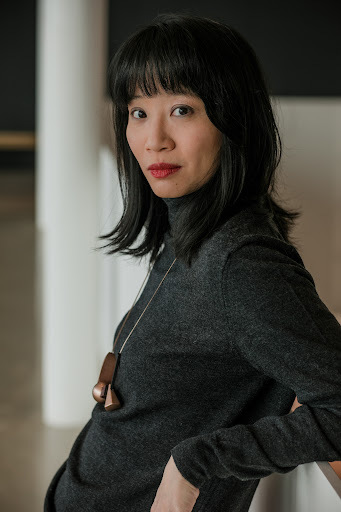 Joanne Leow
grew up in Singapore and lives as an uninvited guest on the unceded territories of the Coast Salish peoples, including the Sḵwx̱wú7mesh Úxwumixw (Squamish), səlilwətaɬ/Selilwitulh (Tsleil-Waututh), xʷməθkʷəy̓əm (Musqueam) and Kwikwetlem First Nations. She is an Associate Professor at Simon Fraser University. Her creative work and research lie at the intersections of the environmental humanities, transnational and diasporic cultural production, intimacies, autotheory, and decoloniality. Her writing has been published in Brick, Catapult, Evergreen Review, The Goose, Isle, The Kindling, The Town Crier, and Ricepaper Magazine.
Seas Move Away
is her debut collection of poetry.
Joanne Leow
grew up in Singapore and lives as an uninvited guest on the unceded territories of the Coast Salish peoples, including the Sḵwx̱wú7mesh Úxwumixw (Squamish), səlilwətaɬ/Selilwitulh (Tsleil-Waututh), xʷməθkʷəy̓əm (Musqueam) and Kwikwetlem First Nations. She is an Associate Professor at Simon Fraser University. Her creative work and research lie at the intersections of the environmental humanities, transnational and diasporic cultural production, intimacies, autotheory, and decoloniality. Her writing has been published in Brick, Catapult, Evergreen Review, The Goose, Isle, The Kindling, The Town Crier, and Ricepaper Magazine.
Seas Move Away
is her debut collection of poetry.1 - How did your first book change your life? How does your most recent work compare to your previous? How does it feel different?
I think that before I published my first poetry collection, seas move away, I didn’t really see myself as a poet or writer but primarily as an academic and ex-journalist. Seeing my poems in print, on the shelves of bookstores and in the hands of readers really helped me understand the materiality of my work.
2 - How did you come to poetry first, as opposed to, say, fiction or non-fiction?
I have been writing poetry since high school… one thing that really changes how I approached it was taking a workshop with the late C.D. Wright at Brown during my undergraduate degree. Reading her work and having my own poems workshopped really opened up my mind to what poetry could be and do.
3 - How long does it take to start any particular writing project? Does your writing initially come quickly, or is it a slow process? Do first drafts appear looking close to their final shape, or does your work come out of copious notes?
I tend to spend a long time thinking about something and then when it comes to setting down words on the paper, that process usually happens fairly quickly. Especially for poems, my initial prose draft is quite close to the final piece. For me, editing is a process of sharpening, cutting, and breaking up the line.
4 - Where does a poem usually begin for you? Are you an author of short pieces that end up combining into a larger project, or are you working on a "book" from the very beginning?
Between work and family life, especially when I was caring for two young boys and then elderly family members who were in a different country, I have always only ever had the time to write in fragments. Yet, I do think these fragments are part of a whole, it’s just that sometimes I can’t see the entire book until the last fragment is down and I can go about structuring my pieces.
5 - Are public readings part of or counter to your creative process? Are you the sort of writer who enjoys doing readings?
I love public readings, as someone who teaches the words of others, it has been a revelatory experience to read and reread my own words to many different audiences. I find that my relationship to my own poems evolve as I read them aloud in different contexts and I learn so much about them from how an audience reacts.
6 - Do you have any theoretical concerns behind your writing? What kinds of questions are you trying to answer with your work? What do you even think the current questions are?
I think it’s an occupational hazard as an academic, but yes, I do have larger theoretical concerns behind my writing. I often find that my poetry and creative nonfiction are where I work out things that can’t be said or explored in conventional academic writing. I find it freeing to incorporate elements of memoir and experiment with language in my creative practice. I am very much concerned with how bodies react when subjected to power and desire and an increasingly hostile climate. I’m interested in global environmental histories and how these are manifested in our family stories and our everyday lives.
7 – What do you see the current role of the writer being in larger culture? Do they even have one? What do you think the role of the writer should be?
I think there shouldn’t be one way to be in larger culture prescribed for all writers. I think that whether they choose to work in a political way or an ahistorical mode, that perhaps there is a need for all different kinds of writing… I admire, read and teach writers who consistently speak truth to power and who aren’t afraid to take risks that way. But I also enjoy writing that lets me escape into different worlds or laugh at silly foibles. I think it’s important to keep that sense of joy alive as well.
8 - Do you find the process of working with an outside editor difficult or essential (or both)?
I find it essential. I have really enjoyed the limited experience I have been privileged to have with literary editors. I think it is so crucial to have an outside perspective on one’s writing… by the end of the first draft, very often you can’t see the forest for the trees as it were.
9 - What is the best piece of advice you've heard (not necessarily given to you directly)?
Finish things.
10 - How easy has it been for you to move between genres (poetry to critical prose)? What do you see as the appeal?
I love all kinds of language and diction, and even if certain legal or political language makes me angry, its power still fascinates me. So in that vein, I actually find it easy to move between genres… terms, words, ideas just spill over from one to the other and sometimes break down these boundaries.
11 - What kind of writing routine do you tend to keep, or do you even have one? How does a typical day (for you) begin?
I don’t have a writing routine! It’s hard to hold down a full time job and to have a family and to find time to write. I start the day with a cup of tea, looking out of my window and then saying good morning to my household of pets and humans.
12 - When your writing gets stalled, where do you turn or return for (for lack of a better word) inspiration?
I go for a walk or take out my watercolours. I try to take my mind off the task at hand knowing that on some level my brain is still working things out.
12 or 20 (second series) questions;
November 18, 2023
the genealogy book : an ongoing work-in-progress via substack,
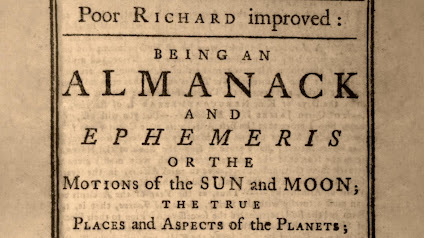 Incase you haven’t caught,
I’ve been posting excerpts (six so far) of my current non-fiction work-in-progress on my substack for a while now
, “the genealogybook.” With the discovery of my birth mother’s name and other details over thepast decade, I’ve been deliberately working to explore some of these new threadsand their implications. Over the past two months, I’ve been posting pieces on variousLoyalist/New England threads, including Puritan (Boston, etcetera), German (I’mcurrently working a piece that references Philadelphia’s Germantown), Irish(the Peter Robinson settlers of Ontario) and Dutch (the New Netherlandssettlement), as well as the counterpoint of my Glengarry Scottish upbringingand foundation. I have a whole new family tree, someone said. I think, instead,I simply have two trees that meet at the roots. Am I any less one side nowbecause of this other?
Incase you haven’t caught,
I’ve been posting excerpts (six so far) of my current non-fiction work-in-progress on my substack for a while now
, “the genealogybook.” With the discovery of my birth mother’s name and other details over thepast decade, I’ve been deliberately working to explore some of these new threadsand their implications. Over the past two months, I’ve been posting pieces on variousLoyalist/New England threads, including Puritan (Boston, etcetera), German (I’mcurrently working a piece that references Philadelphia’s Germantown), Irish(the Peter Robinson settlers of Ontario) and Dutch (the New Netherlandssettlement), as well as the counterpoint of my Glengarry Scottish upbringingand foundation. I have a whole new family tree, someone said. I think, instead,I simply have two trees that meet at the roots. Am I any less one side nowbecause of this other?I’mattempting to treat the substack like a weekly column, and most pieces that I’mposting these days are from this new project, although I am also interspersingwith short stories and the occasional other essay on prose writers (I recentlyposted one on Joy Williams and another on Ernest Hemingway, for example, withanother on Gail Scott forthcoming). You can sign up for free, or for the paidoption. I’m only posting “paid” pieces every third or fourth, as there’s stilla part of me that can’t quite offer terribly much that excludes non-payingoptions.
November 17, 2023
12 or 20 (second series) interview with Sophie Klahr
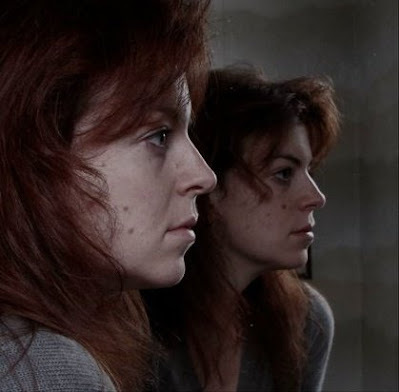
Sophie Klahr is the author of the poetrycollections Two Open Doors in a Field, Meet Me Here at Dawn, andthe collaborative prose work There Is Only One Ghost in the World,written alongside Corey Zeller. Her writing may be found in The New Yorker,American Poetry Review, Poetry London, and elsewhere. She teaches poetry courses online, and lives in Los Angeles.
1 - How did your first book orchapbook change your life? How does your most recent work compare to yourprevious? How does it feel different?
My first chapbook _____ VersusRecovery was published in 2007 by from Pilot Books, a small press (nowdefunct, alas) that hand-sewed gorgeous limited editions. I was 23, and it wasthe first time I’d had work out in the world that addressed my experiences withaddiction and (at the time, very new) recovery. Previous to that, I hadn’tpublished very much at all, and the warm reception the chapbook received wassurprising; suddenly, the most difficult things in my life drew people towardsme, not away.
My very recently published book There Is Only One Ghost in the World (FictionCollective 2) is wildly different from my previous two books, in that not onlyis it a collaborative work but that it is all prose, where my other books havebeen entirely verse. I’ve been writing in prose mostly for a year or so – it’sbeen interesting to take a breath from line breaks. At the moment, I don’t missthem.
2 - How did you come to poetry first,as opposed to, say, fiction or non-fiction?
My childhood was thick with an appreciation of sound. When he was home,no matter where my father was in the house, one could nearly always hear himsinging to himself. At simple everyday questions ( Q: Dad, where aremy ballet shoes?) he would often answer with some sort of poetic line ( A: Whosewoods these are, I think I know…), and at some point, I realized many ofthe verses he said to us (annoyingly, I thought back then) were inscribed inme—I came to know early what it meant to know something by heart. In this way,my becoming a poet became inevitable.
3 - How long does it take to start anyparticular writing project? Does your writing initially come quickly, or is ita slow process? Do first drafts appear looking close to their final shape, ordoes your work come out of copious notes?
What I end up revising the most heavily are my formal poems – some of mysonnets have taken 3 years to write. But there are exceptions – a sonnet ofmine which went viral a few years ago took about two weeks of tinkering untilit expressed that it was complete. I think it was Yeats who said (I may beparaphrasing?) “a poem comes right with a click like a closing box.” I justlisten for that click.
4 - Where does a poem usually beginfor you? Are you an author of short pieces that end up combining into a largerproject, or are you working on a "book" from the very beginning?
It seems to me that a poem comes either from a memory like a toothache orfrom a moment of music in passing. Formally, I do fall into patterns -- most ofthe verse I’ve written for the past 6 years turns towards the sonnet, and in mylast book of verse poems, Two Open Doors in a Field, most of them weresonnets that had the framework of driving and listening to the radio. Whensomething feels good, I tend to want more of it, and because of that, I’ll stayin a single vein of form and subject until some natural conclusion feelsreached, or, i.e. I feel a type of satiation.
5 - Are public readings part of orcounter to your creative process? Are you the sort of writer who enjoys doingreadings?
I prefer not to read my work in front of others; I think my body gets inthe way of my words.
6 - Do you have any theoreticalconcerns behind your writing? What kinds of questions are you trying to answerwith your work? What do you even think the current questions are?
The questions in the prose book I’m currently working surround the natureof honesty and center on an investigation of voice: what / who do we trust whenwe read? Where is the line between “fiction” and “nonfiction”? What does itmean to be an “unreliable” or “reliable” narrator? What stories are “worth”telling?
7 – What do you see the current roleof the writer being in larger culture? Does s/he even have one? What do youthink the role of the writer should be?
All writers do really in some ways ispoint to a moment or thing or idea and say Look! I’d hope that we allpoint to things that feel important, but “important” is defined differently foreveryone.
8 - Do you find the process of workingwith an outside editor difficult or essential (or both)?
These days, I tend to only ask for feedback from a friend or two when apiece feels too close to me, and the questions I put forth to them are usuallybroad. On a book level, I haven’t had much trouble, but that’s likely onlybecause the publishers I’ve had have offered very few edits.
9 - What is the best piece of adviceyou've heard (not necessarily given to you directly)?
Dorothy Parker once said “The cure for boredom is curiosity. There is nocure for curiosity.” I am not a person who ever gets bored, but it seems like agood piece of thought to pass along.
10 - How easy has it been for you tomove between genres (poetry to collaboration)? What do you see as the appeal?
I don’t sit down to write having any expectation for the form that wordswill become. Maybe the words will call for verse, maybe it will want to beprose. I’d like to collaborate more with people who work in visual mediums – afilmmaker friend recently invited me to collaborate on some pitches for adocumentary that won’t have anything to do with literature. I think it mightend up being about Komodo dragons. Collaboration is energizing in part becauseit exercises the muscle of listening, and leans away from ego.
11 - What kind of writing routine doyou tend to keep, or do you even have one? How does a typical day (for you)begin?
I have no routine whatsoever really. Each day begins with my cat beinghungry – his hunger is the most consistent thing in my life.
12 - When your writing gets stalled,where do you turn or return for (for lack of a better word) inspiration?
I don’t relate to the idea of being stalled with writing, but I think Iturn to physical activity when I get into psychic tangles of any kind. Walkingor dancing or swimming always feels clarifying, whether I’m in a moment ofwriting or not.
13 - What fragrance reminds you ofhome?
Roasted chicken and dust.
14 - David W. McFadden once said thatbooks come from books, but are there any other forms that influence your work,whether nature, music, science or visual art?
I think books come from questions. Of the suggestions above, I would saythat nature influences my writing most deeply–I read more nonfiction about thenatural world than any fiction or poetry. As far as visual art, I’ve held keptEdward Hopper’s work as a touchstone for decades years – his spaces and lightand sense of pause. I come from a fairly musical & music-loving family, soreferences to songs actually do seem to often show up in my work naturally. About10 years ago I lived sporadically with the musician Cass McCombs, and living ina space that was really saturated with his music meant that while writing, Iwas also often pausing to listen to the muffled sounds of what he was creatingand playing, far off in some other part of the house, and I think some of thatatmosphere was knit into what I was writing at the time—I actually drew thetitle of my first book Meet Me Here At Dawn from the name of one of hissongs.
15 - What other writers or writingsare important for your work, or simply your life outside of your work?
I am consistently return to Rilke’s Duino Elegies. They feel likea touchstone for spiritual inquiry.
16 - What would you like to do thatyou haven't yet done?
I would like to write a musical with someone! Musical theater is the mostcollaborative art form, and can be profoundly moving. I have been simmering aroundtwo specific ideas for musicals for many years – the key now is finding my owntime that might align with a composer who has time. I’d love to work with mydear friend Daniel Heath, whose work you’re familiar with if you’ve ever heard thelush strings beneath some of Lana Del Rey’s most popular songs, but he’sendlessly busy, so if you are a composer reading this, write to me!
17 - If you could pick any otheroccupation to attempt, what would it be? Or, alternately, what do you think youwould have ended up doing had you not been a writer?
I would have loved to be a paleontologist. It’s a bit late for that Ithink, but I’ve had a fascination with dinosaurs since I was little, and I’mfascinated by how our understanding of them continues to evolve. I recentlyread Steve Brusatte’s book The Rise and Fall of the Dinosaurs: A New History of a Lost World – highly recommend.
18 - What made you write, as opposedto doing something else?
I’m not even sure I can answer the question! Writing has never seemedlike much of a choice.
19 - What was the last great book youread? What was the last great film?
I will offer the two most recent collections of poetry I’ve read by peers:K. Iver’s Short Film Starring My Beloved’s Red Bronco and Eugenia Leigh’sBianca – both are brilliant and incisive.
20 - What are you currently workingon?
I’m working on a chapbook of poems about an angel (which is also aboutaddiction and the penal system) and a book of prose tentatively titled that isin some ways a hall of mirrors to my collaborative book There Is Only OneGhost in the World, though this one is a solo venture. We’ll see whathappens.
November 16, 2023
groundwork: the best of the third decade of above/ground press 2013-2023 has landed!
 the anthology
groundwork: the best of the third decade of above/ground press 2013-2023
has officially landed! (pictured here with copies of the first two volumes); you can pick up a copy via Invisible Publishing (who also has copies of the second volume,
ground rules: the best of the second decade of above/ground press 2003-2013
, originally published by myself and Christine McNair, who designed it also, through Chaudiere Books), or this weekend, as part of the ottawa small press book fair pre-fair reading on Friday and/or
Saturday fair
[note different location: Tom Brown Arena]! Thanks brilliantly much to Invisible publisher Norm Nehmetallah and designer Megan Fildes for their incredible work to bring this project to life!
the anthology
groundwork: the best of the third decade of above/ground press 2013-2023
has officially landed! (pictured here with copies of the first two volumes); you can pick up a copy via Invisible Publishing (who also has copies of the second volume,
ground rules: the best of the second decade of above/ground press 2003-2013
, originally published by myself and Christine McNair, who designed it also, through Chaudiere Books), or this weekend, as part of the ottawa small press book fair pre-fair reading on Friday and/or
Saturday fair
[note different location: Tom Brown Arena]! Thanks brilliantly much to Invisible publisher Norm Nehmetallah and designer Megan Fildes for their incredible work to bring this project to life!November 15, 2023
Second star to the right, and straight on 'til morning,
Incase you hadn’t heard, we spent last week in Florida, attending to Disneything.Myself, Christine, our two young ladies and mother-in-law, running around anddoing many of the many things. Given the Covid-era, as Christine says, we hadn’ta family trip beyond our big July drive [see my report on such here] that ouryoung ladies can even recall (three years in the house, after all, and we haven't been even to father-in-law's condo in Boca Raton since Rose was a toddler), and apparently Disneything is an important partof Christine’s own childhood, having made their way there repeatedly. Christinewas also worried about our young ladies aging out of making the tripworthwhile. And so, we are here.
Although:this is not our first time. Do you recall when we went there as part of that last BocaRaton jaunt back in 2015? (I know Rose doesn’t.) [see my report on such here]
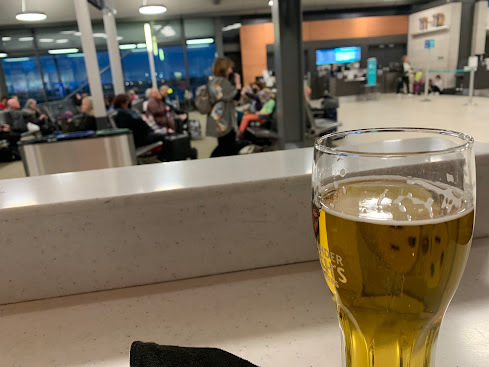 Thursday,November 2, 2023: We flew, late. And our 4:55pm direct flight to Orlando was delayed by nearly four hours, due to something discovered on the flight that landed, earlier that day. Why did it take so long to discover, and then search? Because we weren't told anything at all, I simply presumed it to be a loose monkey on the plane (I attempted to tell this to others around us, but I don't think anyone bought it). Apparently they even had to bring in a sniffer dog. We weren't even sure we'd make it out, honestly. But we did. Aoife knocked out cold on the plane.
Thursday,November 2, 2023: We flew, late. And our 4:55pm direct flight to Orlando was delayed by nearly four hours, due to something discovered on the flight that landed, earlier that day. Why did it take so long to discover, and then search? Because we weren't told anything at all, I simply presumed it to be a loose monkey on the plane (I attempted to tell this to others around us, but I don't think anyone bought it). Apparently they even had to bring in a sniffer dog. We weren't even sure we'd make it out, honestly. But we did. Aoife knocked out cold on the plane.  Friday,November 3, 2023: We woke slow, set in what was most likely a former condo. Oh, how late we got in. Once up, we headed for a full day of Universal, Orlando. Is Orlando a real place, or is it imaginary? A city of highways, condos, resorts and warehouses, it would seem. A city of palm trees and ridiculous adventure-lands. This city might just be imaginary.
Friday,November 3, 2023: We woke slow, set in what was most likely a former condo. Oh, how late we got in. Once up, we headed for a full day of Universal, Orlando. Is Orlando a real place, or is it imaginary? A city of highways, condos, resorts and warehouses, it would seem. A city of palm trees and ridiculous adventure-lands. This city might just be imaginary. Admittedly, the high point was the Harry Potter world stuff (Rose and Aoife had been years collecting change in a jar, all of which was for us to come to this specific place), both Diagon Alley in one corner, and Hogsmeade in another. The children hated the butterbeer (butterscotch foamy drink). I enjoyed a real beer. A dragon breathed fire. There were so many shops! They just wanted our money, methinks. We rode the Hogwarts train. The children collected wands. We went on a Minions ride that was amusing to all. Aoife met characters from the movie Sing. We saw Krazy Kat, and various Marvel things. I purchased a t-shirt.
Admittedly, the high point was the Harry Potter world stuff (Rose and Aoife had been years collecting change in a jar, all of which was for us to come to this specific place), both Diagon Alley in one corner, and Hogsmeade in another. The children hated the butterbeer (butterscotch foamy drink). I enjoyed a real beer. A dragon breathed fire. There were so many shops! They just wanted our money, methinks. We rode the Hogwarts train. The children collected wands. We went on a Minions ride that was amusing to all. Aoife met characters from the movie Sing. We saw Krazy Kat, and various Marvel things. I purchased a t-shirt.
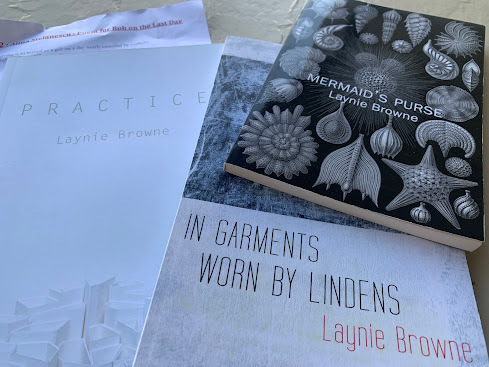 Saturday,November 4, 2023: We had a quiet day, mostly at the condo space. I spent some time with notebook, and books by Laynie Browne, as well as my copy of Barry McKinnon's i wanted to say something, which I'd brought to poke through. I made various notes, some of which I'm still processing, adding to. I am still thinking upon. Christine and her mother made plans.
Saturday,November 4, 2023: We had a quiet day, mostly at the condo space. I spent some time with notebook, and books by Laynie Browne, as well as my copy of Barry McKinnon's i wanted to say something, which I'd brought to poke through. I made various notes, some of which I'm still processing, adding to. I am still thinking upon. Christine and her mother made plans.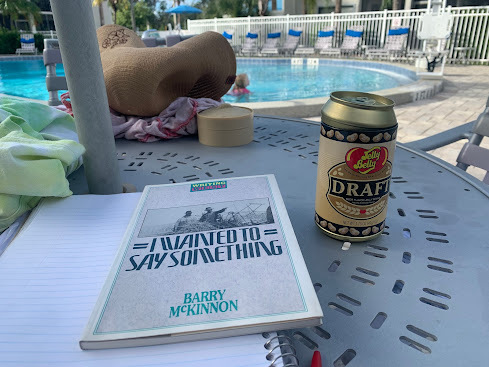 The tennis court across from our window also included a pickleball option, and large-scale chess and checkers, which occasionally folk would wander by and attempt. The children, at one point, made for the pool, so naturally I brought my books and my notebook, sketching out an hour's worth of notes. We wandered stores (I bought new shoes), found a dollar store and Christine and I picked up armloads of candy we can't get up here. Baby Ruth! Beer-flavoured jellybeans! What! Dinner at Red Lobster, a restaurant I don't think I've been to in years. My mother used to enjoy going regularly to one near home with my sister. I always think of them when I think of Red Lobster. The corn bread was excellent.
The tennis court across from our window also included a pickleball option, and large-scale chess and checkers, which occasionally folk would wander by and attempt. The children, at one point, made for the pool, so naturally I brought my books and my notebook, sketching out an hour's worth of notes. We wandered stores (I bought new shoes), found a dollar store and Christine and I picked up armloads of candy we can't get up here. Baby Ruth! Beer-flavoured jellybeans! What! Dinner at Red Lobster, a restaurant I don't think I've been to in years. My mother used to enjoy going regularly to one near home with my sister. I always think of them when I think of Red Lobster. The corn bread was excellent.
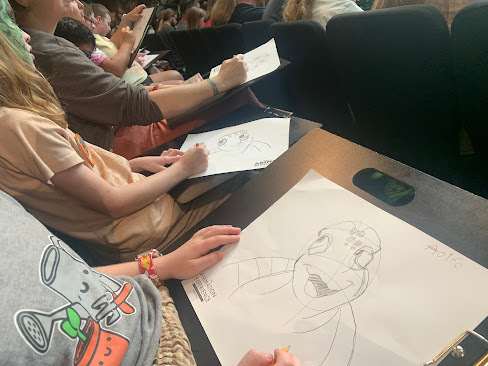 Sunday,November 5, 2023: Disneything, Animal Kingdom. Why are there Christmas trees and decorations everywhere? I don't want to think about that yet. We left our morning condo for our Disney-specific resort, meaning we became folded into the Disney space for five full days. We were beyond the scope of the real world, caught up in what only existed within. Aren't there science fiction films that begin this way? We saw wild animals in wide open spaces and attended an animation session, learning how to draw the sea turtle from Finding Nemo.
Sunday,November 5, 2023: Disneything, Animal Kingdom. Why are there Christmas trees and decorations everywhere? I don't want to think about that yet. We left our morning condo for our Disney-specific resort, meaning we became folded into the Disney space for five full days. We were beyond the scope of the real world, caught up in what only existed within. Aren't there science fiction films that begin this way? We saw wild animals in wide open spaces and attended an animation session, learning how to draw the sea turtle from Finding Nemo. 
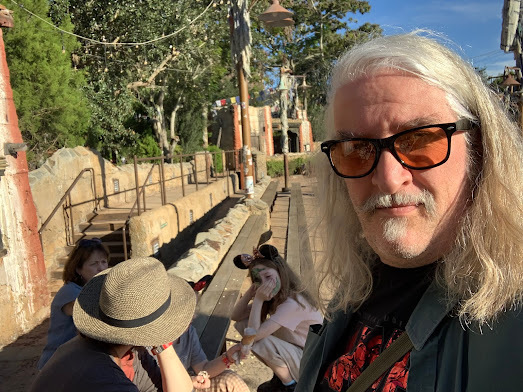 We saw a giraffe, some lions, some hippo. We saw artificial mountains. The scale of this place I find quite overwhelming, quite terrifying. Why is everything so enormously big?
We saw a giraffe, some lions, some hippo. We saw artificial mountains. The scale of this place I find quite overwhelming, quite terrifying. Why is everything so enormously big?
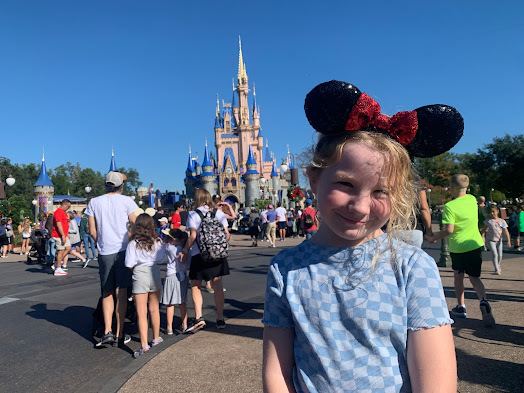 Monday,November 6, 2023: Magic Kingdom, day one. Did I ever imagine myself here, let alone three times, including twice in one week? It is all madness, really. The real chaos is knowing that, no matter how busy this seems, we're here in the off-season. We wandered spaces and rides, and the young ladies caught photos with Winnie-the-Pooh and Tigger (I kept calling them "Winston the Poop" and "Tiggles," which my entire menagerie found rather irritating). I was surprised how much Rose was enamoured with all of this, less than three weeks away from ten (when she would be priced as an adult, which was a big factor in the timing of this trip). Apparently Winnie-the-Pooh is her favourite, which I had no idea. I should tell her about the Winnie-the-Pooh and the Blustery Day VHS that we'd put in regularly when her big sister Kate was a toddler, when we needed just twenty minutes or so to be able to breathe on our own (we played that thing hundreds of times, I think). Aoife even insisted on writing Winnie-the-Pooh a note of thanks, while I think Rose caught an autograph.
Monday,November 6, 2023: Magic Kingdom, day one. Did I ever imagine myself here, let alone three times, including twice in one week? It is all madness, really. The real chaos is knowing that, no matter how busy this seems, we're here in the off-season. We wandered spaces and rides, and the young ladies caught photos with Winnie-the-Pooh and Tigger (I kept calling them "Winston the Poop" and "Tiggles," which my entire menagerie found rather irritating). I was surprised how much Rose was enamoured with all of this, less than three weeks away from ten (when she would be priced as an adult, which was a big factor in the timing of this trip). Apparently Winnie-the-Pooh is her favourite, which I had no idea. I should tell her about the Winnie-the-Pooh and the Blustery Day VHS that we'd put in regularly when her big sister Kate was a toddler, when we needed just twenty minutes or so to be able to breathe on our own (we played that thing hundreds of times, I think). Aoife even insisted on writing Winnie-the-Pooh a note of thanks, while I think Rose caught an autograph.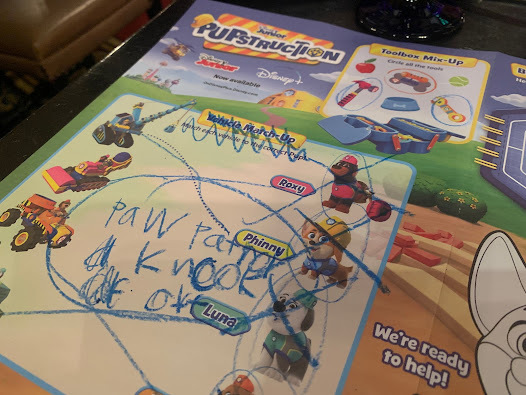 The young ladies later had the (mostly) full princess treatment, and even dinnered at the castle, with five different Disney princesses wandering through. Rose and Aoife complained heavily on their paper placemats of the obvious Disney-specific Paw Patrol knock-offs, "pupstruction," and I admired their venom, but not sure which side to be on, in this one. Both sides have their problems, but one would think that Disney would have been able to find their own characters to display instead of skewering another, right? It was ridiculous, with wait staff dressed in castle finery, and various princesses wandering through for photographs and autographs (all of which our young ladies garnered), and they were both given plastic swords at the end (apparently boys got swords and shields, and girls were supposed to get something else, but they were out of those). So many small girls in that space dressed as princesses, swinging plastic swords around. More princesses need their own swords, I say.
The young ladies later had the (mostly) full princess treatment, and even dinnered at the castle, with five different Disney princesses wandering through. Rose and Aoife complained heavily on their paper placemats of the obvious Disney-specific Paw Patrol knock-offs, "pupstruction," and I admired their venom, but not sure which side to be on, in this one. Both sides have their problems, but one would think that Disney would have been able to find their own characters to display instead of skewering another, right? It was ridiculous, with wait staff dressed in castle finery, and various princesses wandering through for photographs and autographs (all of which our young ladies garnered), and they were both given plastic swords at the end (apparently boys got swords and shields, and girls were supposed to get something else, but they were out of those). So many small girls in that space dressed as princesses, swinging plastic swords around. More princesses need their own swords, I say. 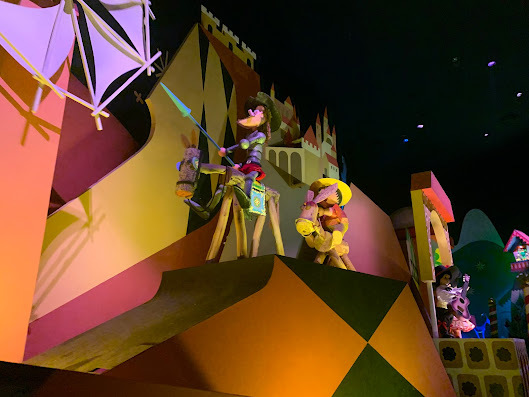 Oh yes, and the "it's a small world" ride, once more. We did same with toddler Rose, but she remembers none of it. Both ladies were quite taken with it. I mean, the old standards are important. And Don Quixote!
Oh yes, and the "it's a small world" ride, once more. We did same with toddler Rose, but she remembers none of it. Both ladies were quite taken with it. I mean, the old standards are important. And Don Quixote!
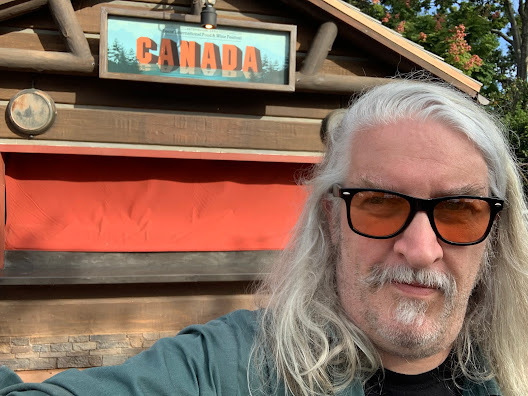 Tuesday,November 7, 2023: Epcot, wandering. We went through Canada, of course, as I sang songs by The Tragically Hip under my breath. We caught the Day of the Dead festival display in Mexico, and mother in law purchased a cuckoo clock in the German Pavillion, to replace one she once had, long gone. I considered a stein, but the price, weight, travel considerations and the fact that I don't even use the ones I have at home prompted me to rethink (they were pretty cool, though). Did you know that "stein" translates to "stone"? There was a grand arch in the Chinese Pavillion (ours in Ottawa is better). We had lunch in the same German buffet we did from that prior visit, but mis-timed from the show. I kept telling Aoife that we were depending upon her German language classes for the sake of ordering, which terrified her (no! I can't do that!). The food was grand (traditional!) but uber-expensive. Mein Gott!
Tuesday,November 7, 2023: Epcot, wandering. We went through Canada, of course, as I sang songs by The Tragically Hip under my breath. We caught the Day of the Dead festival display in Mexico, and mother in law purchased a cuckoo clock in the German Pavillion, to replace one she once had, long gone. I considered a stein, but the price, weight, travel considerations and the fact that I don't even use the ones I have at home prompted me to rethink (they were pretty cool, though). Did you know that "stein" translates to "stone"? There was a grand arch in the Chinese Pavillion (ours in Ottawa is better). We had lunch in the same German buffet we did from that prior visit, but mis-timed from the show. I kept telling Aoife that we were depending upon her German language classes for the sake of ordering, which terrified her (no! I can't do that!). The food was grand (traditional!) but uber-expensive. Mein Gott! 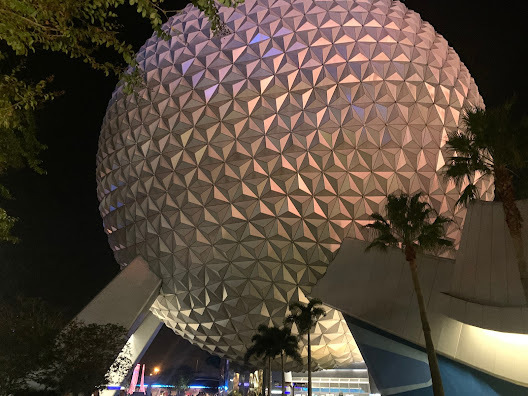 We caught a ride with Olaf and Elsa and Anna. We wandered the whole history of human civilization through Epcot, and dinnered with an aquarium of fish (where Rose, again, complained of the placemats and character knock-offs). We rode through Imagination Land. A sequence of days where there was barely enough time to wake, check email, and leave. Once back to the resort at the end of the day, we all crashed.
We caught a ride with Olaf and Elsa and Anna. We wandered the whole history of human civilization through Epcot, and dinnered with an aquarium of fish (where Rose, again, complained of the placemats and character knock-offs). We rode through Imagination Land. A sequence of days where there was barely enough time to wake, check email, and leave. Once back to the resort at the end of the day, we all crashed.
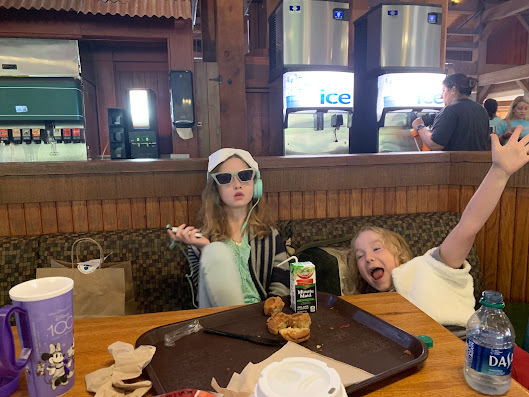 Wednesday,November 8, 2023: Cafeteria breakfast, at the resort. As this snapshot suggests, Rose is leaning pretty hard into pre-teen stuff, I would say. I ask you: what is morning? What is coffee? A needlessly-expensive bottle of (what I would discover to be) terrible wine collected for evenings.
Wednesday,November 8, 2023: Cafeteria breakfast, at the resort. As this snapshot suggests, Rose is leaning pretty hard into pre-teen stuff, I would say. I ask you: what is morning? What is coffee? A needlessly-expensive bottle of (what I would discover to be) terrible wine collected for evenings.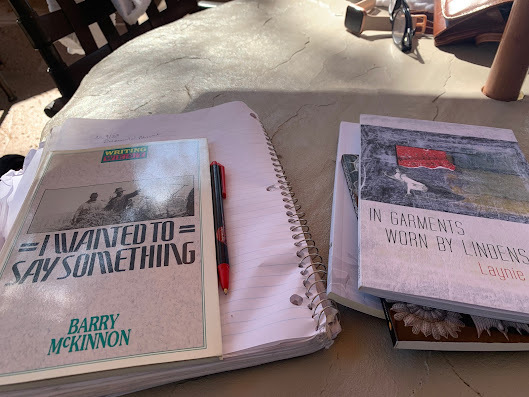 There is an island by our resort with a pool, so I sat with Barry McKinnon again, as mother in law and the children splashed about. I made further notes, and thought about whether I should garner a beer, for Barry's sake (it was barely 11am, so decided it was a bit early).
There is an island by our resort with a pool, so I sat with Barry McKinnon again, as mother in law and the children splashed about. I made further notes, and thought about whether I should garner a beer, for Barry's sake (it was barely 11am, so decided it was a bit early).





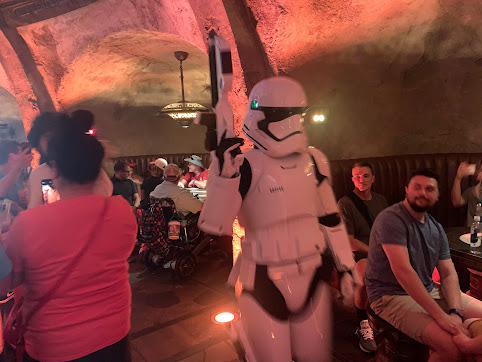 Today was Hollywood Studios, so I was pretty excited for the sake of the Star Wars stuff. I took Barry to see the Millennium Falcon, naturally. I took Barry McKinnon into the Cantina. Not even the Storm Troopers who came through could wrest that away from me. And we realized that Christine, in her own way, was inadvertently dressed entirely appropriate for Tattoine.
Today was Hollywood Studios, so I was pretty excited for the sake of the Star Wars stuff. I took Barry to see the Millennium Falcon, naturally. I took Barry McKinnon into the Cantina. Not even the Storm Troopers who came through could wrest that away from me. And we realized that Christine, in her own way, was inadvertently dressed entirely appropriate for Tattoine.
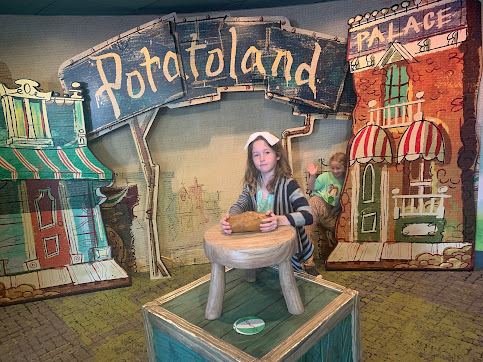 We went to a Mickey Mouse animated short in one theatre, and had a 3-D Muppet Show experience in The Muppet Theatre. We went to Potatoland. We had buckets upon buckets of popcorn. We had dinner in a drive-in theatre that showed theatrical trailers from classic horror flicks! After the past couple of days, Christine appreciated how quiet this particular dinner was, volume-wise. All eyes caught up on the big screen. Plan 9 from Outer Space!
We went to a Mickey Mouse animated short in one theatre, and had a 3-D Muppet Show experience in The Muppet Theatre. We went to Potatoland. We had buckets upon buckets of popcorn. We had dinner in a drive-in theatre that showed theatrical trailers from classic horror flicks! After the past couple of days, Christine appreciated how quiet this particular dinner was, volume-wise. All eyes caught up on the big screen. Plan 9 from Outer Space!
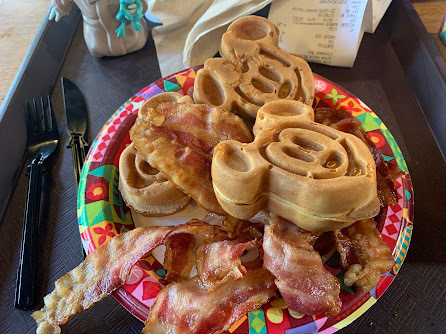 Thursday,November 9, 2023: Not enough food here is shaped like Mickey Mouse. Is this a real complaint I have? Hard to tell, isn't it. We took a riverboat after breakfast to one of the other resorts nearby, mainly so we could catch a riverboat, but also, so we could make the French Quarter resort and have those sugar-donut things. What are those called? I know Christine and I had some back in New Orleans in 2012 [remember when we were down there?]. Naturally, Rose managed to get white sugar everywhere (and yes, they were shaped like Mickey Mouse, as they should be).
Thursday,November 9, 2023: Not enough food here is shaped like Mickey Mouse. Is this a real complaint I have? Hard to tell, isn't it. We took a riverboat after breakfast to one of the other resorts nearby, mainly so we could catch a riverboat, but also, so we could make the French Quarter resort and have those sugar-donut things. What are those called? I know Christine and I had some back in New Orleans in 2012 [remember when we were down there?]. Naturally, Rose managed to get white sugar everywhere (and yes, they were shaped like Mickey Mouse, as they should be). After that, we made for our second Magic Kingdom day before heading out. We saw the noon parade, which we caught the tail end of again, repeated, later on. How many times does one see two parades in a single day? Hard to imagine the staff not sick of such things, after a time. The sky was perfect blue.
After that, we made for our second Magic Kingdom day before heading out. We saw the noon parade, which we caught the tail end of again, repeated, later on. How many times does one see two parades in a single day? Hard to imagine the staff not sick of such things, after a time. The sky was perfect blue.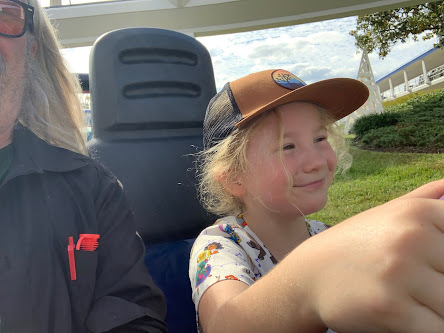 We caught an enormity of rides, again. They caught Aladdin's carpet ride at one point, the spinning aliens from Toy Story, and the Dumbo rides (classic), of course. Which day did I regrettably catch The Guardians of the Galaxy ride that nearly killed me? I can't even remember now. I regret it, terribly. It nearly did me in. And there was a follow-up, a day or two later, via Star Wars that nearly did the same. And yet, the children were fine. Let us speak no more of this.
We caught an enormity of rides, again. They caught Aladdin's carpet ride at one point, the spinning aliens from Toy Story, and the Dumbo rides (classic), of course. Which day did I regrettably catch The Guardians of the Galaxy ride that nearly killed me? I can't even remember now. I regret it, terribly. It nearly did me in. And there was a follow-up, a day or two later, via Star Wars that nearly did the same. And yet, the children were fine. Let us speak no more of this. Honestly, the craziest part of Disney is that we kept seeing these things. The future, indeed!
Honestly, the craziest part of Disney is that we kept seeing these things. The future, indeed! And Aoife wanted a picture of this guy, who I recognized but she didn't. Quite terrifying, really. At least he's the mandolin player (as we all know: bass players can't be trusted).
And Aoife wanted a picture of this guy, who I recognized but she didn't. Quite terrifying, really. At least he's the mandolin player (as we all know: bass players can't be trusted).I insisted on catching the Hall of Presidents, also, before we left the park. There was considerable resistance by the adults in our group, but it was better than we might have thought. Odd, the whole thing of it. What are the stories we tell ourselves of ourselves?
And then leaving the park at 5pm to get back to the resort to pick up the car and our stuff to drop the car off at the airport and catch our 9pm flight home. A bit of chaos, that. And the smallest one barfed a couple of times right at the moment we were entering security (she was fine in the end, but it made the whole experience askew). Both kids slept on the plane. I did, also.
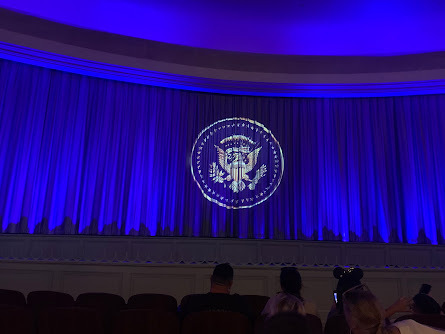 Friday,November 10, 2023: We are home, exhausted. Exhausted. Landed well after midnight. In our beds after 1am. Wemove very little once we are up in the morning. If at all. Did we move at all?
Friday,November 10, 2023: We are home, exhausted. Exhausted. Landed well after midnight. In our beds after 1am. Wemove very little once we are up in the morning. If at all. Did we move at all?
November 14, 2023
new from above/ground press: Collis, Armantrout, Christie, Reimer, Berlatsky, Mellis, Chernoff, Dachsel + Report from the fitzpatrick Society,
 ; Gardens in Motion, by Stephen Collis $5 ; STORY LINE, by Rae Armantrout $5 ; glass / language / untitled / exaltation (second printing, by Jason Christie $5 ; Dinosaurs of Glory, by Nikki Reimer $5 ; Send $19.99 for Supplements and Freedom, Collages and Uncreative Writing, by Noah Berlatsky $5 ; Unconsciousness Raising, by Miranda Mellis $6 ; ESTRO FLUNKY: FIELD NOTES, by MLA Chernoff $5 ; ashes, by Marita Dachsel $5 ; Report from the [ryan] fitzpatrick Society, Vol 1. No. 1, edited by rob mclennan $7 ;
; Gardens in Motion, by Stephen Collis $5 ; STORY LINE, by Rae Armantrout $5 ; glass / language / untitled / exaltation (second printing, by Jason Christie $5 ; Dinosaurs of Glory, by Nikki Reimer $5 ; Send $19.99 for Supplements and Freedom, Collages and Uncreative Writing, by Noah Berlatsky $5 ; Unconsciousness Raising, by Miranda Mellis $6 ; ESTRO FLUNKY: FIELD NOTES, by MLA Chernoff $5 ; ashes, by Marita Dachsel $5 ; Report from the [ryan] fitzpatrick Society, Vol 1. No. 1, edited by rob mclennan $7 ; AND DID YOU SEE THAT JASON CHRISTIE WON THE 2023 bpNICHOL CHAPBOOK AWARD LAST WEEK FOR HIS 2022 ABOVE/GROUND PRESS TITLE? (second printing now available, as well as a Jason Christie bundle,
keep an eye on the above/ground press blog for author interviews, new writing, reviews, upcoming readings and tons of other material; see the previous batch of backlist here,
published in Ottawa by above/ground press
October-November 2023
as part of the above/ground press 30th anniversary
a/g subscribers receive a complimentary copy of each
To order, send cheques (add $1 for postage; in US, add $2; outside North America, add $5) to: rob mclennan, 2423 Alta Vista Drive, Ottawa ON K1H 7M9. E-transfer or PayPal at at rob_mclennan (at) hotmail.com or the PayPal button (above). Scroll down here to see various backlist titles, or click on any of the extensive list of names on the sidebar (many, many things are still in print).
Review copies of any title (while supplies last) also available, upon request.
Forthcoming chapbooks by Sacha Archer, Dale Tracy, Melissa Eleftherion, Kyle Flemmer, Saba Pakdel, Lydia Unsworth, Katie Ebbitt, Colin Dardis, Russell Carisse, Micah Ballard, Cary Fagan, Amanda Deutch, Kyla Houbolt, Gary Barwin, Adriana Oniță, Blunt Research Group, Phil Hall + Steven Ross Smith, Zane Koss, Peter Myers, Ben Robinson, Terri Witek, Pete Smith, Angela Caporaso and a collaborative/call-and-response between Julie Carr and rob mclennan (among others, most likely). And 2024 subscriptions are now available!
November 13, 2023
12 or 20 (second series) questions with David Martin
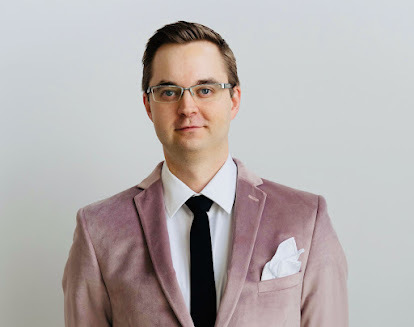 David Martin
worksas a literacy instructor in Calgary and as an organizer for the Single OnionPoetry Series. His first collection,
Tar Swan
(NeWest Press, 2018), wasa finalist for the Raymond Souster Award and the City of Calgary W. O. MitchellBook Prize. David’s work has been awarded the CBC PoetryPrize, and has been shortlisted for prizes from FreeFall, Vallum, PRISMinternational,and the Alberta Magazine Awards. As well, he was named a “Writerto Watch” in 2023 by CBC Books. His latest collection, Kink Bands, waspublished by NeWest Press in September of 2023.
David Martin
worksas a literacy instructor in Calgary and as an organizer for the Single OnionPoetry Series. His first collection,
Tar Swan
(NeWest Press, 2018), wasa finalist for the Raymond Souster Award and the City of Calgary W. O. MitchellBook Prize. David’s work has been awarded the CBC PoetryPrize, and has been shortlisted for prizes from FreeFall, Vallum, PRISMinternational,and the Alberta Magazine Awards. As well, he was named a “Writerto Watch” in 2023 by CBC Books. His latest collection, Kink Bands, waspublished by NeWest Press in September of 2023. 1- How did your first book change your life? How does your most recent workcompare to your previous? How does it feel different?
Idon’t think my first book, Tar Swan, changed my life drastically, but itwas rewarding to see in print a project that had taken about ten years tocomplete. It was also very gratifying when readers and reviewers would engagewith what I had written and spent so much time working on.
Inmy most recent work, Kink Bands, I moved away from the book-lengthnarrative style of my first collection, but I still kept things feeling unifiedwith the general theme of geology coursing through the poems. I believe that Iwas able to explore more experimental aspects of my poetry, while also movingtowards a personal, lyrical approach in some of the pieces.
2- How did you come to poetry first, as opposed to, say, fiction or non-fiction?
Iwas taking an undergraduate survey course in poetry, and was immersed instudying the famous names of the art, when I happened to meet with a group thatcalled themselves the Drunken Poets Society. They would get together everyMonday at the Ship & Anchor Pub and discuss poetry, as well as share theirown work. This was quite a revelation for me, to find writers for whom poetrywas a living art, and the combination of studying poetry at the university andrevelling in the new poetry that I was hearing really got me hooked on theform.
3- How long does it take to start any particular writing project? Does yourwriting initially come quickly, or is it a slow process? Do first drafts appearlooking close to their final shape, or does your work come out of copiousnotes?
Theprojects usually develop slowly, with a general sense of what I’m seeking, butthis can shift and be refined as I continue to work on them. Often my firstdrafts, of both individual poems and manuscripts, look very different than thefinal versions. I’m always aiming to fine tune a piece and see how it can beimproved or taken in a new direction.
Forsome projects, like Tar Swan, I will do a lot of research, bothtechnical and archival, while others have a more direct link to my personalexperiences.
4- Where does a poem usually begin for you? Are you an author of short piecesthat end up combining into a larger project, or are you working on a"book" from the very beginning?
Forsome manuscripts, I have a guiding theme from the outset, and for others it’smore a process of writing to find out what I’m really writing about. In a fewcases, an editor who is helping me with my work will discern a theme ornarrative that I was not aware of, and then this can be something I uncover andexplore more deliberately. It’s interesting to me when an outside perspectivecan recognize patterns and ideas in the work that I’m not noticing.
5- Are public readings part of or counter to your creative process? Are you thesort of writer who enjoys doing readings?
Ienjoy sharing my work at readings, but it’s usually when pieces are quite faralong in their development.
6- Do you have any theoretical concerns behind your writing? What kinds ofquestions are you trying to answer with your work? What do you even think thecurrent questions are?
Ioften have a general question or general theme that I’m chasing in my work. Forinstance, with my first book I was interested in creating an understanding ofthe history and mythology of the Alberta oil sands that one wouldn’t find inother books about the subject. With the most recent collection, Kink Bands,I was wondering about how to use geology as a means of looking at the world,how to experiment with the theme in ways that perhaps other poets haven’texplored, and how to enact geological processes within the space of a poem.
7 –What do you see the current role of the writer being in larger culture? Do theyeven have one? What do you think the role of the writer should be?
Ithink each writer makes their own decision about where their interests lie andwhere they will focus their attention. Often there is a binary between personaland public-facing poetry, but there are many examples of introspective workthat resonates with a group of readers and thus takes on a public aspect. Iwouldn’t want to prescribe a strict role for the poet in society (as witness,philosopher, avant-garde experimenter, etc), but instead think that each poetis pulled to the themes that move them the most.
8- Do you find the process of working with an outside editor difficult oressential (or both)?
Ifind it incredibly helpful to work with an editor, as long as it is someone whois engaged with the poems and whose advice I trust. Often I get caught up in myown ideas, and it’s necessary for me to find out what someone else will make ofwhat I’ve written. Are they able to come along with me on the poetic journey I’velaid out (no matter how strange it may be), or have I lost them somewhere alongthe way? I’ve had positive experiences with editors who are able to discern acohesive theme from a set of what I felt were miscellaneous poems, and I’ve hadgreat experiences with an editor finding the one word or line that needs to bechanged to make everything click into place.
9- What is the best piece of advice you've heard (not necessarily given to youdirectly)?
Thebest piece of advice was given to me by a co-worker, almost in passing, and itpertains to raising kids. She told me that when your kids are young they willneed help with almost everything, but you, as the parent, will be able to solvepretty much all of their problems. As your children grow up, however, they willneed less and less help, but the situations that they do require assistancefrom you will be harder for you to solve (social interactions, friendships,etc). I always liked that advice, and especially as it was delivered offhandwhile at work.
10- What kind of writing routine do you tend to keep, or do you even haveone? How does a typical day (for you) begin?
Idon’t have a strict writing routine, but I do try to carve out a few dedicatedslots of time during the week when I can focus on writing.
11- When your writing gets stalled, where do you turn or return for (for lack ofa better word) inspiration?
UsuallyI find reading poetry will get me out of a rut of some kind. I try to readquite widely, in general, and I find that ideas can pop up from readingscientific articles, poems, essays, news articles, pretty much anything.
12- What fragrance reminds you of home?
Thescent of baking coming from the my mother’s kitchen is a strong reminder ofhome for me.
13- David W. McFadden once said that books come from books, but are there anyother forms that influence your work, whether nature, music, science or visualart?
Mywork can be influenced by historical events, environmental phenomena,scientific research, listening to music, and many other things.
14- What other writers or writings are important for your work, or simply yourlife outside of your work?
I’ma big fan of the poet Michael Donaghy. He isn’t all that well known in NorthAmerica, as most of his publishing was done in the U.K., but when I came acrosshis work it was a revelation to me about what could be done in the small spaceof a single poem. He makes intricately designed works seem like the mostnatural thing that you happen to be overhearing.
15- What would you like to do that you haven't yet done?
I’mworking on a libretto for an opera, and during the pandemic I tried my hand atwriting a novel. So I’ve been trying to work outside of my normal comfort zone.Maybe one day I’ll try writing short fiction, something I’ve never really donebefore.
16- If you could pick any other occupation to attempt, what would it be? Or,alternately, what do you think you would have ended up doing had you not been awriter?
I’ma musician in several different bands, but a part of me wonders what it wouldhave been like to try to be a professional musician.
17- What made you write, as opposed to doing something else?
Ido other things, such as work as a literacy instructor, play music, andvolunteer for a poetry reading series, but I’m always drawn back to writingbecause I’m obsessed with the possibilities of language, and I’m constantlyseeking new avenues to explore in my poetry.
18- What was the last great book you read? What was the last great film?
Idon’t watch many movies, unless it’s something my kids want to see.
Thelast great book I read was The Liars of Nature and the Nature of Liarsby Lixing Sun. I’m starting a new project about cheats, thieves, andcon-artists, in both the human and non-human worlds, and this book was veryinteresting and relevant for me.
19- What are you currently working on?
Rightnow I’m working on the final edits for a collection coming out next spring. It’sa work of experimental translations, framed by a speculative fiction narrative,and I’m a little apprehensive about what people will think about it.
November 12, 2023
Dorothea Lasky, The Shining
BLUE CHRISTMAS
I am so excited
I am dancing with mysister
In the front of therestaurant
Two men look at us andsmile
We are wearing theclearest blue dresses
That look like the sky inthe middle of the spring
There is a pretend antagonismto our song
But we know that wereally love each other
Years later they willfilm us as children
Wearing matching dressesagain
But the blue will bemuted
Soon after they will showus chopped up
As always they will beobsessed
With the violence men cando to us
But I was only evertrying to do my job
I only ever wanted to bea movie star
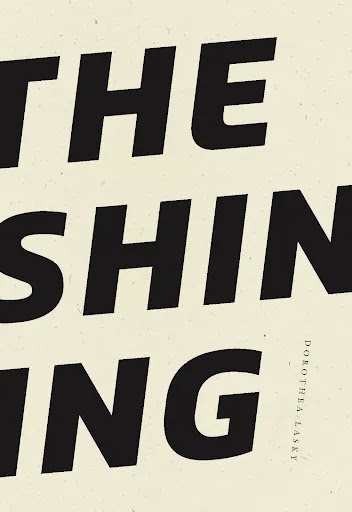 Thelatest from American poet Dorothea Lasky, following her essay-quartet,
Animal
(Seattle WA/New York NY: Wave Books, 2020) [see my review of such here] is thepoetry collection,
The Shining
(Wave Books, 2023). Riffing off itsnamesake film, as the press release offers, Lasky’s The Shining “is anekphrastic horror lyric that shapes an entirely unique feminist psychologicallandscape. Here, Lasky guides us through the familiar rooms of the OverlookHotel, both realized and imagined, inhabiting characters and spaces that havebeen somewhat flattened in Stephen King’s text or Stanley Kubrick’s film adaptations.” Lasky fleshes out the asides to the main action, almost as a darkturn (if one might say) akin to Tom Stoppard’s 1966 play Rosencrantz and GuildensternAre Dead, or even Steve Englehart’s run through West Coast Avengers#17-24 (1987) that ran alongside and through early Avengers and FantasticFour histories. Through her usual playful swagger of dark turns, Laskyutilizes the bones of the source material to carve out lyrics sharp enough to drawblood. “I was Dorothea Lasky,” she writes, to close the poem “TIME,” “Now myname is nothing / But I never forgot my name / Did you [.]” Lasky’s poems aredark and complex, writing of innocence revealed and lost, writing slant acrossa horror lyric. “The key to surviving in here,” she writes, to open the poem “STRANGEHUMOR,” “Is to pretend every room is haunted / Even when it isn’t [.]” Laskywrites from and within spaces King and Kubrick could never hope to fathom,offering a sequence of horrors that exist not purely in the extraordinary but acrossmore familiar spaces. Through Lasky, background characters move from meredecoration to flesh, and to acknowledgment and even, finally, agency. “What islanguage / Is the question I ask the large peacock,” she writes, as part of thepoem “MARRIAGE,” “Who sits at the end of the bed / Smiling the grin of demons /Bending its neck to get a good look at me [.]” It is through Lasky, finally,that these characters are allowed their own stories.
Thelatest from American poet Dorothea Lasky, following her essay-quartet,
Animal
(Seattle WA/New York NY: Wave Books, 2020) [see my review of such here] is thepoetry collection,
The Shining
(Wave Books, 2023). Riffing off itsnamesake film, as the press release offers, Lasky’s The Shining “is anekphrastic horror lyric that shapes an entirely unique feminist psychologicallandscape. Here, Lasky guides us through the familiar rooms of the OverlookHotel, both realized and imagined, inhabiting characters and spaces that havebeen somewhat flattened in Stephen King’s text or Stanley Kubrick’s film adaptations.” Lasky fleshes out the asides to the main action, almost as a darkturn (if one might say) akin to Tom Stoppard’s 1966 play Rosencrantz and GuildensternAre Dead, or even Steve Englehart’s run through West Coast Avengers#17-24 (1987) that ran alongside and through early Avengers and FantasticFour histories. Through her usual playful swagger of dark turns, Laskyutilizes the bones of the source material to carve out lyrics sharp enough to drawblood. “I was Dorothea Lasky,” she writes, to close the poem “TIME,” “Now myname is nothing / But I never forgot my name / Did you [.]” Lasky’s poems aredark and complex, writing of innocence revealed and lost, writing slant acrossa horror lyric. “The key to surviving in here,” she writes, to open the poem “STRANGEHUMOR,” “Is to pretend every room is haunted / Even when it isn’t [.]” Laskywrites from and within spaces King and Kubrick could never hope to fathom,offering a sequence of horrors that exist not purely in the extraordinary but acrossmore familiar spaces. Through Lasky, background characters move from meredecoration to flesh, and to acknowledgment and even, finally, agency. “What islanguage / Is the question I ask the large peacock,” she writes, as part of thepoem “MARRIAGE,” “Who sits at the end of the bed / Smiling the grin of demons /Bending its neck to get a good look at me [.]” It is through Lasky, finally,that these characters are allowed their own stories.

